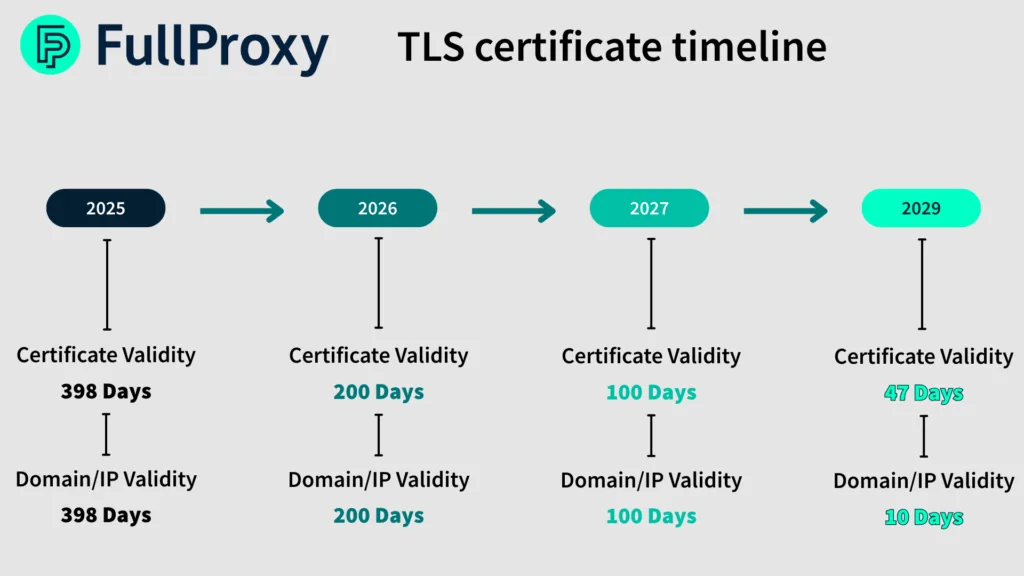
The push for certificate lifecycle reduction stems from a fundamental truth: certificate lifecycle management is not a team member’s core job role – it’s often an afterthought and annoyance, a general admin task. With these changes, this will fundamentally not be the case. Here’s what shorter lifecycles help prevent:
- Expired certificates causing downtime
- Forgotten certificates at the heart of your infrastructure, creating hidden vulnerabilities
- Difficulty replacing compromised certificates quickly and securely
By reducing certificate validity to just 47 days, the CA/B Forum is forcing organisations to prioritise certificate management and embrace automation.
Answering common questions about certificate lifecycle reduction
When will the changes come into effect?
In April 2025, the CA/Browser Forum approved Ballot SC-081v3, initiating a phased reduction in TLS certificate validity periods:
- March 15, 2026: Maximum certificate lifespan reduces to 200 days.
- This means you will be renewing your certificates nearly twice as often, this is the time where you should be monitoring your certificates.
- March 15, 2027: Further reduction to 100 days.
- This means you will be renewing your certificates more than three times as often. By this point you should be considering post-quantum readiness, and putting the structures in place for this.
- March 15, 2029: Final reduction to 47 days.
- You will be renewing your certificates almost eight times as often. At this point, it is vital you have full automation across your certificate estate.
*If your average certificate lifecycle is 365 days
Will certificate lifecycle reduction cause more outages?
Only if you still manage certificates manually. If you rely on spreadsheets or calendar reminders, yes-this change is a risk. But if you adopt automated certificate lifecycle management, you’ll actually reduce outages.
Is this just for big enterprises?
No. Every organisation using TLS (including small businesses) is affected. Shorter certificate lifespans are a universal standard, and so is the need to manage them properly.
Is automation really necessary?
With a 47-day lifecycle, it’s no longer optional. Certificates will need to be renewed and redeployed every few weeks. Automation is the only scalable solution.
By reducing certificate validity to just 47 days, the CA/B Forum is forcing organisations to prioritise certificate management and embrace automation.
Post-Quantum Cryptography and the role of shorter certificate lifecycles
While this policy is about lifespan, it also sets the stage for post-quantum cryptography (PQC), another major shift in digital trust.
Quantum computing threatens to break RSA and ECC, the cryptographic foundations of most certificates. By adopting shorter certificate lifespans now, you can benefit in three ways:
- Cryptographic agility: Easier to migrate to PQC-compatible algorithms as they are standardised
- Limited risk window: Short-lived certs reduce the damage of potential future quantum attacks
- Infrastructure readiness: Forces updates to tooling, platforms, and practices now before PQC hits
TLS certificate lifecycle reduction is a full strategic enabler for future-proofing businesses and public sectors across the world.
Quantum computing threatens to break RSA and ECC, the cryptographic foundations of most certificates.
FullProxy’s take: Change = Opportunity
At FullProxy, we see this change not as a burden, but as an opportunity to modernise.
“FullProxy strongly advocates for automated certificate lifecycle management. Automation enables faster rotation, broader visibility, and more agile response to emerging threats” – Read our blog on the National Cyber Security Centre’s post-quantum timeline.
- Eliminate certificate-related outages through automation
- Build cryptographic agility for the quantum future
- Strengthen overall cyber security posture
- Future proof yourself against further certificate lifespan reductions
The shift to 47-day lifespans is a challenge but it’s also a forcing function for better security and visibility.
How to Prepare for TLS Certificate Lifecycle Reduction
Here’s how you can get ready:
- Discovery and Visibility
- Gain full discovery and visibility of your certificate estate.
- Monitoring
- Monitor your full estate to ensure all certificates are up to date and compliant.
- Analysis
- Regularly analyse and report your findings throughout the monitoring process.
At FullProxy, we partner with AppViewX to offer certificate lifecycle management services to businesses and public sector bodies across Europe.
Get in touch with us today to learn more, and book a demo with one of our technical experts.




